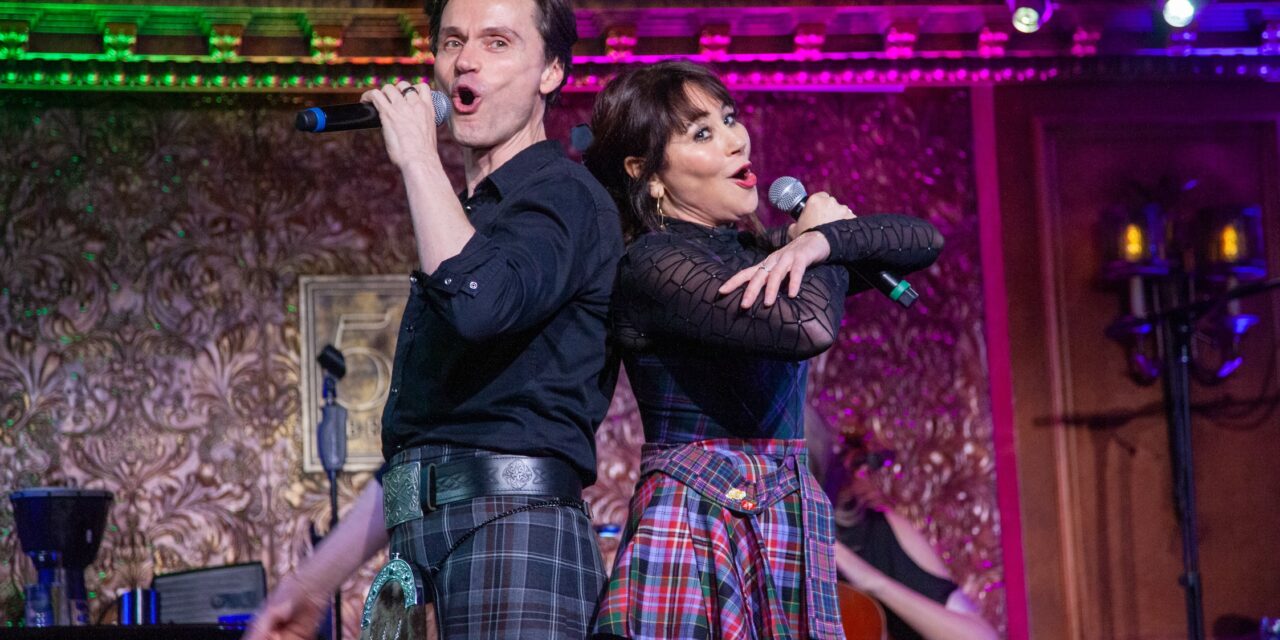Review By Marilyn Lester . . .
West End and Broadway actress-singer, the Tony® Award winning, Frances Ruffelle, is a fierce storyteller. In this show, Frankie & Beausy at 54 Below on November 11, Ruffelle tells a story of love, the kind that Cupid’s arrows produce. Her partner in this tale is real-life beau, the leading West End star Norman Bowman. Although written and crafted by both of them, one has to wonder is this a real story about the pair? A fable? A fiction? No matter, it’s a darn good story, and one that probably most people in the audience could relate to in many ways as their story.





The key to this tale is that pretty much all relationships are imperfect. So Ruffelle (Frankie) and Bowman (Beausy) have decided, if that’s the way it is, why not celebrate it in song? And thus a musical journey through all sorts of varied material takes us on a ride through the world of Eros. Ruffelle fans know she has a style—she’s one of those identifiable performers with a unique voice and a big personality. She’s coquettish and cocky, soft and warm and slightly cutting too. In expression and song interpretation she communicates volumes. Bowman is Scots. That alone also speaks volumes. There’s a special quality to those men in kilts (and yes, they both wear them in this show). Wherever did the idea of the dour Scotsman come from? Like his fellows of the highlands and low, Bowman is simply a honey. And he’s got a lovely voice. Should we doubt for a moment that Bowman is Scots, there’s the antic, fun “Beausy, Where’s Your Troosers” (Neil, Grant, Andy Stewart).


Frankie & Beausy is a song cycle comprised of a set of eclectic but on-point numbers. It begins happy and ends happy, but in-between is the arc of that old Hollywood trope: boy gets girl, boy loses girl, boy gets girl again—the end. Of course, that’s a simplistic and humorous observation. There’s a lot of complexity in this production and it includes doses of humor along with hurt and uplift. Most of all, the songs themselves do the most work; the narrative is spare, but powerful. They begin whimsically with “Doodling Song” (Max Bennett, Cy Coleman, Carolyn Leigh). From this outset, there’s synergy between the two; harmony is in their vocals and in their energy as a real couple.






The staging is as whimsical as much of the delivery of the numbers. Ruffelle’s take on “It’s Alright with Me” (Cole Porter) is decidedly sexy and kittenish. Yet, with the duet, “Almost Like Being In Love,” (Frederick Loewe, Alan Jay Lerner) the interpretive accent is on the word “almost.” Then there comes a point when two people who are obviously attracted to each other move beyond caution to declaration. “Marry me!” exclaims Beausy after a rendition of “Spooky” (Dusty Springfield). They have found “Something Good” (Richard Rodgers, Oscar Hammerstein II) and the audience feels a collective empathy for these two in a warm and fuzzy way. The cherry on the sundae of bliss seems to be “Happy to Keep Her Dinner Warm” (Frank Loesser), but in the narrative and staging (the show was superbly directed by Paul Baker), there’s a disturbance in The Force. Perhaps all isn’t as it appears to be.


Indeed, there’s trouble in paradise. By this point in Frankie & Beausy there’s no question that coupling and love and romance is often confounding. We need only look to the Bard for guidance. Shakespeare, in his collected works, uses the word “love” 2,146 times, mostly glorified but sometimes not so much—from “when love speaks, the voice of all the gods make heaven drowsy with the harmony” to “Being vex’d, a sea nourish’d with lovers’ tears: What is it else? A madness most discreet, a choking gall and a preserving sweet.” The depth of Frankie & Beausy is equally bardic. Beyond the thrill of new love, they wonder, how does the dynamic play out; is love equal? Does one partner love more than the other? “Unusual Way” (Maury Yeston) in duet is as good an answer as any to musically contemplate the mysteries, consequences and patterns of love.
The beautiful and wise lyric of Dougie McLean’s “Caledonia” bring us back to resolution, in duet. The door to happiness is in the final number of the show, “I’m Gonna Be (500 Miles)” (Charlie Reid and Craig Reid). Most known via the Scottish duo The Proclaimers for the soundtrack of Benny & Joon (1993), the number is an unwavering declaration of love, full of happiness and rhythmic joy. It was enthusiastically performed with gleeful choreography, putting the button on the Frankie and Beausy story; it was the perfect choice of an exeunt.


In an encore, Ruffelle performed her signature song, “On My Own” (Claude-Michel Schönberg, Alain Boublil), a delightful consequence of her Tony win as the original Eponine in Les Miserables. It was followed up by Ruffelle with a rock tune, “Pencil Full of Lead” (Paulo Nutini), leaving the evening on a decidedly upbeat note. Backing up the pair in Frankie & Beausy was music director-pianist Ryan McKenzie, who played the heck out of the varied and demanding numbers. Cellist Mairi Dorman-Phaneuf provided exquisite texture and with drummer Han Van Schiver, who was key in setting mood, completed a trifecta of superb musicianship.
Photos: Stephen Mosher


















